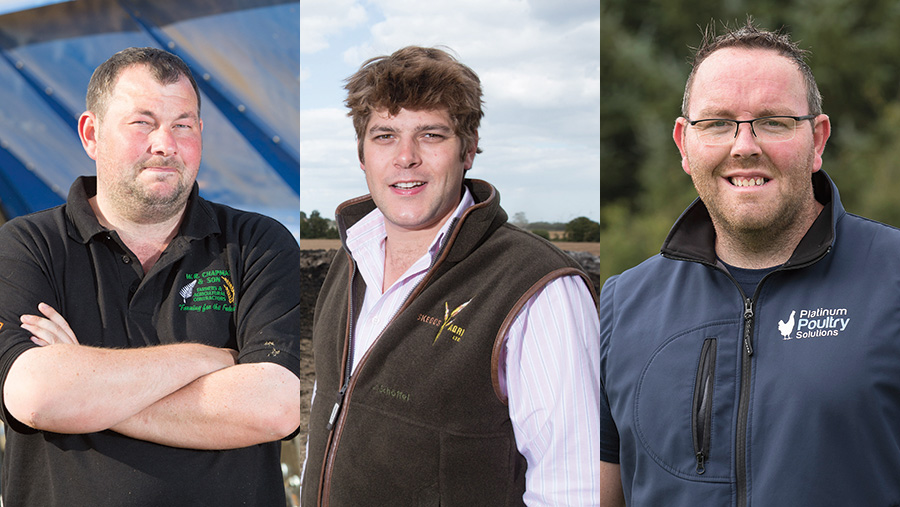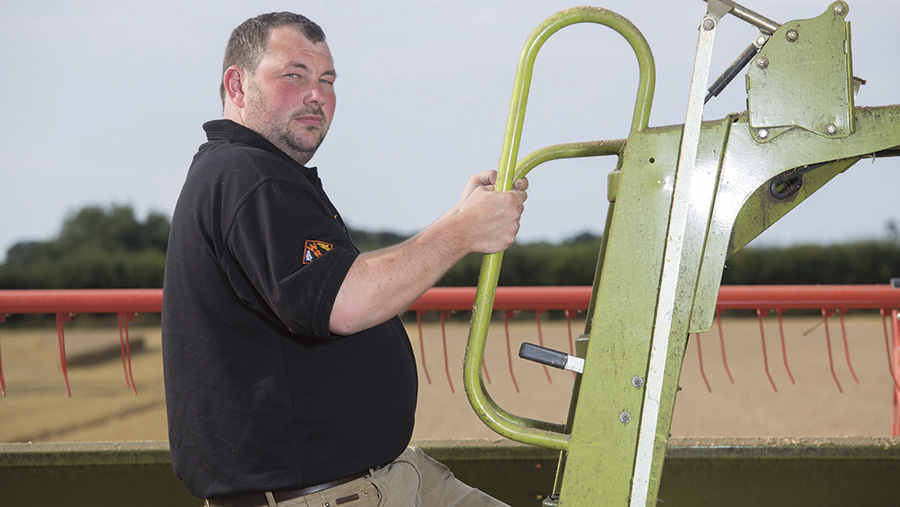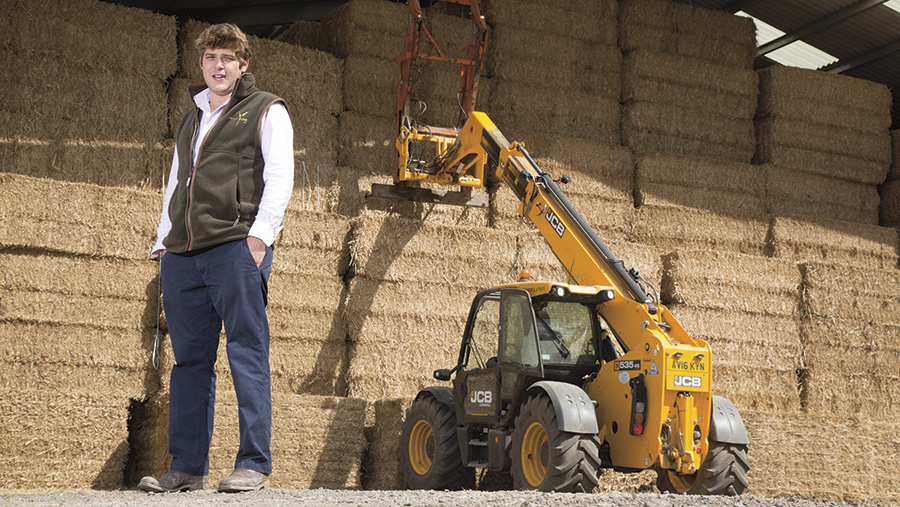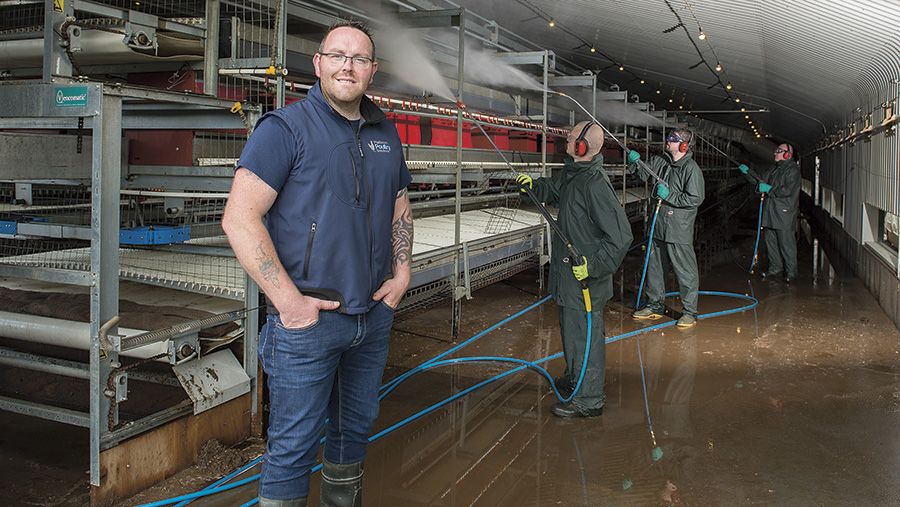2016 Farmers Weekly Awards: Contractor of the Year finalists revealed
The Farmers Weekly Awards celebrate the very best of British farming by recognising and rewarding innovation, hard work and passion for agriculture.
Good organisation, a committed team of staff and a strong work ethic are essential characteristics of any farm contracting business, as our three finalists demonstrated. Oliver Mark profiles the finalists.

From left: William Chapman, Ben Skeggs, Scott Lawrie
See also: Keep up with the latest from the 2016 Farmers Weekly Awards
William Chapman
WR Chapman & Son, Eastmoor, Norfolk

William Chapman runs a fleet of four second-hand Claas combines to make his harvesting services more flexible © Tim Scrivener
A farming obsession has reshaped the 45-year-old family business that William Chapman now calls his own.
For years, plant hire was WR Chapman’s bread and butter but, after cutting his teeth on other farms, Will returned home in 2008 and switched the focus to farming where repeat custom brings a more reliable source of income.
He is now the boss of the ag-contracting arm, but still insists on running a chunk of the business from the tractor seat.
He enjoys the practical work, but also strongly believes that demonstrating a good work ethic – rather than barking out orders from the office door – keeps his team motivated.
Initially, he used kit from the 400ha-plus family farm to get the contracting operation off its feet.
The judges likes
Year-round business keeps full-time employees busy
Established a team of loyal staff
Willing to invest where necessary
Not afraid to run second-hand machinery
Multiple combines improve harvest flexibility
He later added sugar beet harvesting that covered 1,200ha a season at its peak, but the bottom eventually fell out of the market and the increased competition played havoc with his pricing.
As the sugar beet service ran dry he turned his attention to a local AD plant, which gave him the opportunity to expand his operation in double-quick time.
“We took on a 10-year contract to grow rye and maize from cultivations to clamp, and had minimal competition because no one else in the area was geared-up for the job.”
“It took more planning than we first expected.
“Being in a predominantly arable area meant villages weren’t accustomed to having silage trailers running all night, and the previous contractor had a lot of complaints relating to the haulage job.
“To keep the residents happy we decided to haul with lorries, which we loaded with big, moving-floor Dezeure trailers.”
This year the operation has doubled in size to two teams and 2,400ha, but there is still just one customer – the AD plant.
Despite the simplicity of the arrangement, Will insists on a paperwork trail for every load.
It means he can track the time spent from loading to tipping each trailer to help calculate haulage costs, while forager telematics allows him to monitor trailer waiting times, tonnage/day and diesel usage.
The big investments required to get the AD business up and running haven’t deterred Will, either.
“We’re not afraid to spend money where it’s needed. In fact, we’re looking at buying artic lorry tankers and a self-propelled Holmer Terra Variant to deal with the 100,000cu m of digestate produced annually by the plant.
“It opens even more doors for us because, depending on nitrate vulnerable zones, we can have a long spreading window that will include stubble work, top-dressing cereals and maize ground.”
Establishing a variety of services means he’s now got a steady flow of work throughout the year to keep the six-man team busy.
“We try and give each man his own responsibilities so that they feel valued, including their own vehicle and tools.
“We also conduct post-harvest meetings that give the team the chance to chip in with opinions and suggestions on how the last harvest went and whether there’s any room for improvement next time round.”
Business facts
20 customers across East Anglia
Arable services include combining, sugar beet harvesting, drilling and spraying
Also runs five lorries and plant hire business
Six full-time, plus eight seasonal
Part-timers are employed during the busy seasons and are housed on-site.
They come from New Zealand – thanks to long-standing family contacts – and work on a two-year cycle, often travelling round Europe during the quiet season before returning ready for silaging.
Will relies on dealer finance packages to continue his investment in new kit, which he tailors to pay only when the machine is being used.
Two mechanics keep the mixed-brand fleet, which includes the four Claas combines, running sweet. Last year they covered 2,000ha and travelled up to 40 miles from home, but this year it has increased to 3,250ha and there’s still capacity to do more.
The large area includes early-harvested patches near the coast and later-season crops on the Fens, which helps reduce the risk of having all four machines parked up at the same time.
“We’re beating rivals to contracts because we’re running several combines, which means we’re not forced to cut crops that aren’t fit to go. On paper it might look more efficient to run a single big machine, but we’ve found it doesn’t always play out that way.”
The combines all come second-hand with a season’s warranty.
It means someone else has already taken the depreciation hit and they get the maintenance required to keep running them far longer than most other contractors, with the eldest now 12 years old.
It’s the same story with the tractors.
The Fendts can arrive with 3,000 hours on the clock – but still get a slice of warranty – while the deal for a brace of new Valtras was structured with payments equivalent to hiring and still included a 6,000 hour/six-year warranty.
“We replaced an 8000-series Deere with an 11-plate Challenger on 6,000 hours. Rather than paying the fat end of £200,000 new, we spent £60,000 on a machine that had been dealer-maintained and came with warranty, and it saved us a shedload of cash in the process.”
“Being shrewd in the machinery market can pay dividends,” he says.
Ben Skeggs
Skeggs Agri, Tillingham, Essex

Ben Skeggs started his straw baling and carting operation in 2002 and has now diversified into muck and lime spreading © Tim Scrivener
Ben Skeggs isn’t one to pass up a business opportunity.
Having started life as a straw baling service, Skeggs Agri now has its fingers in all sorts of pies from digestate spreading to construction and everything in between.
Ben began the straw carting and stacking operation in 2002 after landing a contract for a power station. Two years later, the first Hesston 4900 arrived and the baling business quickly found its feet.
By 2010, the fleet was six balers strong, and he’s now shifting up to 30,000t/year for 80 different straw customers.
The judges liked
Keen to find new business opportunities
Established trade links across Europe
Well-fitted workshop minimises reliance on dealers
Renewed focus on costs to increase profits
Diversifications dovetail with existing business
It has taken some sizeable investments in the process, but Ben is usually willing to splash the cash if the sums add up.
For many years, balers were leased for £10,000-£12,000, but the prices rose and forced Ben to rethink his strategy.
Most machines are now purchased and the regular rotation policy has been scrapped.
The latest addition is a high-density Krone HDP2, which should be capable of pumping out 20,000 bales a season if it is worked hard and will leave the 8,000/year Hesstons in its shadows.
“As we’ve progressed we’ve had to let go of some of the smaller, sub-100 acre jobs, because we can’t be as efficient – the balers can cover up to 150 acres/day when they’re running flat out in big fields.
“Geographically, we’re pinned between two rivers, so the baling operation stretches from the east coast to Harlow in the far west of Essex,” says Ben.
Baling is a delicate business that is hugely influenced by the weather.
Customer management and interaction is key to knowing when the crop is cut, what the weather is doing, and when a baling team will be able to get there.
Ben readily admits he’s not the cheapest contractor in the area, but firmly believes that his prompt service justifies the extra fee.
“Honesty is the best policy. If we can’t make it to the field for any reason, we will speak to the farmer and keep him informed.”
“The same goes for any ruts caused by the chasers – it’s in both parties’ interests to keep sites level, so we sort any damage before cultivations get under way.”
Business facts
80 straw customers across the south-east of England
Services include baling and carting, as well as biosolids, muck and lime spreading, haulage and construction
22 full-time, plus 15 seasonal staff
To try to minimise the downtime, Skeggs has purposely got an overcapacity machinery fleet to guarantee the service while the weather is good.
Extra balers are hired in if things get particularly busy, while a gang of single-rotor rakes can be used to turn wet straw.
There’s also a huge stock of spare parts on site to reduce the reliance on dealers and manufacturers should there be a mechanical mishap.
Three well-qualified mechanics are part of the team, which means most jobs can be done in house, and there’s a hydraulic hose workshop on site, too.
A good chunk of the straw, hay and haylage bales are shipped over to Europe where buyers are willing to pay a premium for good-quality crops.
Since 2010, Ben has also been looking for diversification opportunities as the competition for baling contracts intensifies around Essex.
With very few stock farmers in the local area, he found an opportunity to spread biosolids and digestate on arable land for farmers desperate to increase their soil organic matter.
Gangs will travel up to 150 miles to spread vast amounts of sewage for two-week periods. Bunning spreaders are used to distribute the solids, while a Joskin tanker and umbilical system applies the digestate.
Fertiliser and lime is another established side-business, where the company’s baler tractors can be used in the off-season to supply, transport and spread the material.
The extra business means Skeggs can keep more permanent staff on the books, rather than relying on a seasonal workforce.
There are 22 full-time, plus another 15 during harvest, and some of them return year after year, which benefits customer relationships.
“The hay and straw side of the business has almost reached capacity. It’s a seasonal business so we’re hoping to add other services that complement what we’ve already got.”
AD foraging has been identified as a potential opportunity for expansion, along with compost, green waste and a big beef enterprise.
“We’re planning to buy in Friesian calves that can be fattened from three months to 16 months in an American-style system, before marketing the produce direct to restaurant chains.
“It means we can make use of the top layers from straw stacks that used to go to mushroom growers.
“We store more than 10,000t of straw annually so there’s always going to be wasteage, but hopefully we can put it through the cattle instead, which will make better use of it.”
Scott Lawrie
Platinum Poultry Solutions, Bonnyrigg, Midlothian

Scott Lawrie saw the move to multi-tier bird housing systems as an opportunity to grow his company © Angus Findlay
From his humble beginning on a Fife council estate, Scott Lawrie could never have imagined he would be running one of the country’s leading poultry house cleaning operations.
After landing a few casual jobs cleaning old wooden chicken sheds, he established strong contacts with several major barn egg producers.
At the time, legislation was coming into play that demanded lower stocking densities for egg-producing birds. It saw many of the big players switch to multi-tier systems – either new builds or conversions of old barns – to allow more birds to be housed within a given floor space.
For many it meant either go big or go bust, but Scott saw it as the perfect opportunity to establish a professional cleaning operation for the more complicated shed layouts.
Though he still washes hen houses for a few smaller farmers running slatted-floor systems with 16,000 birds, a large chunk of his work comes from 100,000-bird operations and a majority of customers are in the top 10% of producers in the country.
Efficiency is the name of the game when it comes to hen house cleaning. Scott’s army-like planning has halved the average two-week clean-out, which means Platinum Poultry can move on to the next job and the hen house gets an extra week’s laying time.
To make the process as pain-free as possible, he tees up the farmer beforehand with a pre-clean pack that dictates everything the team expects when it turns up on the day.
The aim is that the four- or six-man squad can be up and running within an hour of reaching the site.
The company is based around Fife and Lothian and has offices in Edinburgh, but is now a national business that operates between York and the Black Isle of Scotland, north of Inverness.
For Scott and his 16-strong team it means a lot of travelling, so to make the process as enjoyable as possible, the team stays in holiday cottages with all expenses paid by the company.
The judges liked
Wage band structure for employees
Innovative ideas to improve efficiency
Carefully worked costings
Keen to get involved in the industry
Weekly nights out and a quarterly bonus scheme keeps morale and motivation high, too.
Most of the staff come from Edinburgh and many have worked with the company for years, so they’ve seen the sites before and visit the same jobs time and again.
Nonetheless, Scott clocks up 40,000 miles every year travelling between farms to conduct post-job swab tests to make sure the cleaning job is up to scratch.
Those that are new to the business are put through an in-house training programme for power washing and are mentored over the first 10 jobs.
Each gang has a hands-on supervisor – who has been at the company for a minimum of three years – and a two-to-one ratio of first-aiders.
Platinum Poultry’s machinery fleet looks very different to the average Contractor of the Year entrant’s.
Diesel-powered pressure washers kitted out with specialist telescopic lances allow the team to work safely from ground level, while stumpy versions help get at awkward areas.
Good logistics management for time-critical jobs
All the washers are leased and replaced every 18 months. Some jobs can use 40,000 litres/day, so the kit is worked hard and servicing is done by the hire company.
Six men and their associated machines are loaded into a new fleet of long-wheelbase vans, while everything else – including water and disinfectant – is delivered directly to site.
Previously, water was hauled in bowsers, but Scott’s new system sees tankers traded for £72-a-piece pop-up swimming pools that hold 6,600 litres of water and make moving the kit around a whole lot easier.
Scott has also designed and manufactured his own digger-mounted auger system for pulling muck from underneath multi-tier systems, which he now hires out, as well as a range of disinfectant products for the treatment of red mite.
Business facts
More than 100 customers extending from York to Inverness
16 full-time staff split across up to four cleaning squads
Cleans hen houses holding anything from 16,000-100,000 birds
Specialises in multi-tier housing systems
Return bookings are put in the diary once the post-job cleaning reports have been delivered.
Despite being marketed entirely on reputation and word of mouth, the company is fully booked until November 2017, with some hen houses signing up two flocks in advance.
Scott places a lot of importance on client relationships. He aims to have bimonthly chats to see how the birds are getting on and also heads the Scottish avian influenza awareness group.
It prepares action plans for potential outbreaks and means he can send alerts to his customers if there are any risks to flock health in the UK.
Alongside the regular chicken house work, Scott has established sideline operations that include clearing up after the Royal Highland Show and at the United Auctions cattle markets.
Solar panel cleaning also keeps the team busy during biosecurity break days and makes use of the kit already carried round in the vans.
The 2016 Farmers Weekly Awards Contractor of the Year award is sponsored by JCB.
![]() “Working with their customers and keeping a close eye on the agricultural contracting landscape has enabled each of the finalists to grow their businesses in an industry that is more challenging than ever before”
“Working with their customers and keeping a close eye on the agricultural contracting landscape has enabled each of the finalists to grow their businesses in an industry that is more challenging than ever before”
Alastair Bourne
JCB marketing manager

